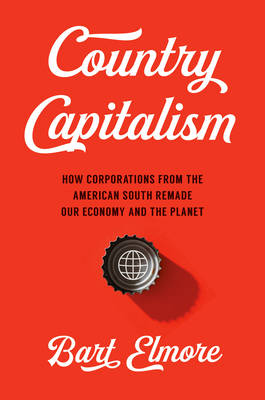
- Afhalen na 1 uur in een winkel met voorraad
- Gratis thuislevering in België vanaf € 30
- Ruim aanbod met 7 miljoen producten
- Afhalen na 1 uur in een winkel met voorraad
- Gratis thuislevering in België vanaf € 30
- Ruim aanbod met 7 miljoen producten
Zoeken
Country Capitalism
How Corporations from the American South Remade Our Economy and the Planet
Bart Elmore
€ 38,95
+ 77 punten
Omschrijving
The rural roads that led to our planet-changing global economy ran through the American South. That region's impact on the interconnected histories of business and ecological change is narrated here by acclaimed scholar Bart Elmore, who uses the histories of five southern firms--Coca-Cola, Delta Airlines, Walmart, FedEx, and Bank of America--to investigate the environmental impact of our have-it-now, fly-by-night, buy-on-credit economy. Drawing on exclusive interviews with company executives, corporate archives, and other records, Elmore explores the historical, economic, and ecological conditions that gave rise to these five trailblazing corporations. He then considers what each has become: an essential presence in the daily workings of the global economy and an unmistakable contributor to the reshaping of the world's ecosystems. Even as businesses invest in sustainability initiatives and respond to new calls for corporate responsibility, Elmore shows the limits of their efforts to "green" their operations and offers insights on how governments and activists can push corporations to do better.
At the root, Elmore reveals a fundamental challenge: Our lives are built around businesses that connect far-flung rural places to urban centers and global destinations. This "country capitalism" that proved successful in the US South has made it possible to satisfy our demands at the click of a button, but each click comes with hidden environmental costs. This book is a must-read for anyone who hopes to create an ecologically sustainable future economy.
At the root, Elmore reveals a fundamental challenge: Our lives are built around businesses that connect far-flung rural places to urban centers and global destinations. This "country capitalism" that proved successful in the US South has made it possible to satisfy our demands at the click of a button, but each click comes with hidden environmental costs. This book is a must-read for anyone who hopes to create an ecologically sustainable future economy.
Specificaties
Betrokkenen
- Auteur(s):
- Uitgeverij:
Inhoud
- Aantal bladzijden:
- 248
- Taal:
- Engels
- Reeks:
Eigenschappen
- Productcode (EAN):
- 9781469673332
- Verschijningsdatum:
- 23/05/2023
- Uitvoering:
- Hardcover
- Formaat:
- Genaaid
- Afmetingen:
- 156 mm x 240 mm
- Gewicht:
- 544 g

Alleen bij Standaard Boekhandel
+ 77 punten op je klantenkaart van Standaard Boekhandel
Beoordelingen
We publiceren alleen reviews die voldoen aan de voorwaarden voor reviews. Bekijk onze voorwaarden voor reviews.








